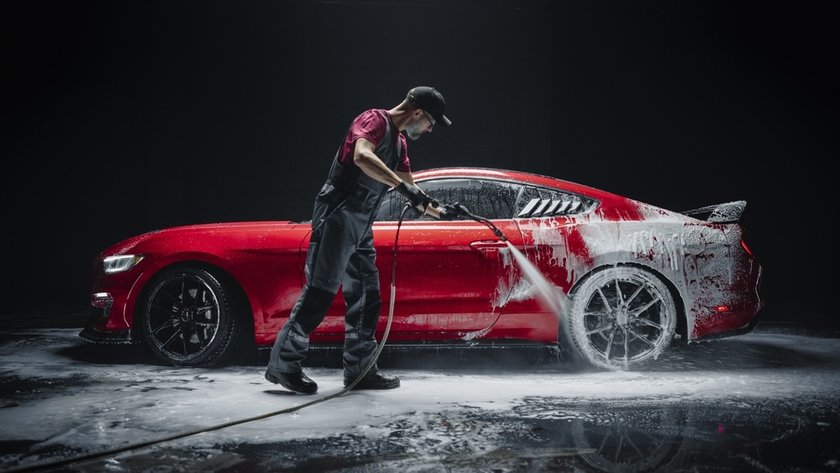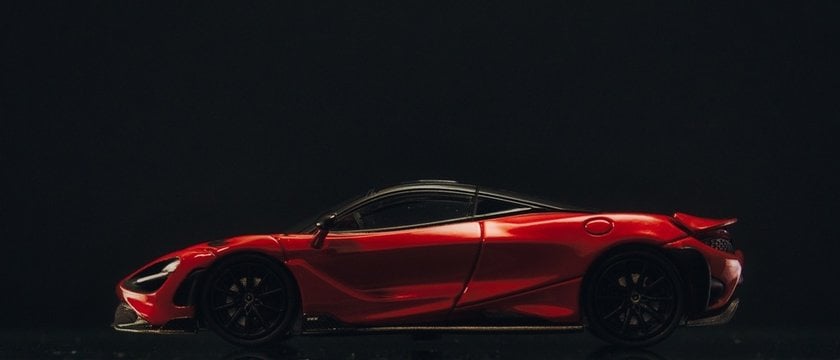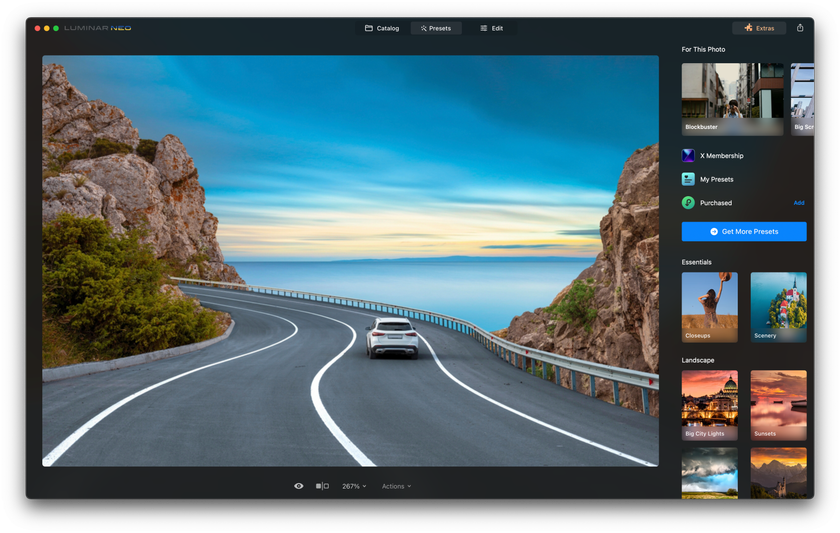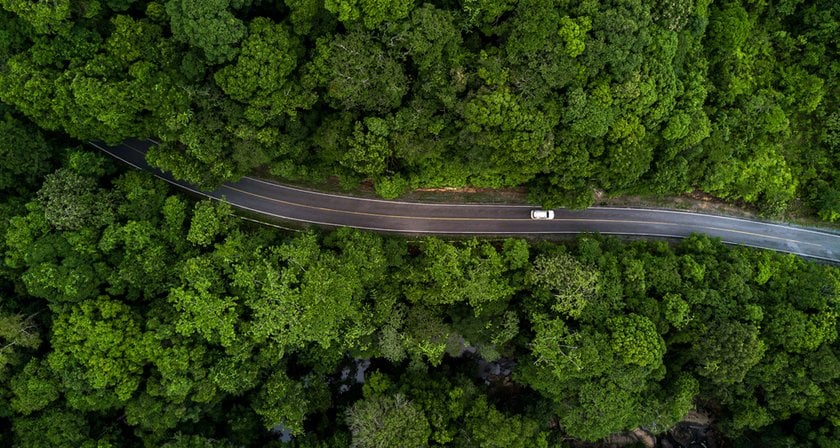November 17
12 min. to read
How To Photograph HyperCars + Editing Tutorial
 In the article, we will show you how to shoot a car with precision and style, ensuring your shots reach magazine-quality standards. But this article not only includes basic tips on choosing the best way to photograph cars but also provides detailed instructions on how to edit your car pictures using Luminar Neo editing software.
In the article, we will show you how to shoot a car with precision and style, ensuring your shots reach magazine-quality standards. But this article not only includes basic tips on choosing the best way to photograph cars but also provides detailed instructions on how to edit your car pictures using Luminar Neo editing software.
So, fasten your seatbelts as we embark on a thrilling journey through the world of supercar photography!
How To Shoot A Car: General Recommendations
Capturing a hypercar in all its glory is more than just pointing your camera and clicking. A good photographer who works with cars must understand the nuances of light, angles, and the vehicle's personality. They should have a keen eye for detail.
Here are some expert tips to help you create stunning photographs that do justice to these remarkable machines:
Advanced yet easy-to-use photo editor
Get Luminar Neo Now1. Selecting the Ideal Location
The choice of location is pivotal in complementing the personality of the car you're photographing. Remember, every inanimate object, including a car, has its own story, and as a photographer, your task is to bring that story to life.
Consider the character of the car and match it with an appropriate backdrop. Urban environments can highlight sleek, modern designs, winding roads are perfect for showcasing performance and agility, and picturesque landscapes can emphasize elegance and luxury.
2. Exploring Light and Shadow Dynamics
Engage with the interplay of light and shadows to craft dynamic compositions in your car photography. Optimal times for such photography are during the golden hours just after sunrise or before sunset, when the light is warm and soft, lending an extraordinary quality to even the most ordinary cars.
Additionally, don't hesitate to experiment with different weather conditions. Rain, fog, or snow can dramatically shift the mood of your photos, offering a range of diverse and unique visual experiences.
3. Mastering Background Composition
The background in your car photography plays a crucial role in ensuring the vehicle remains the show's star. Aim for a clean and uncluttered backdrop that allows the car to be prominently featured. An effective technique is to manually adjust your camera to the widest aperture setting. This approach helps in creating a shallow depth of field, blurring out any distracting elements in the background.
4. Diverse Angle Dynamics
Experiment with different angles for varied effects. Use low angles for a commanding presence, and eye-level shots to highlight the car's sleek design. Move around to find the best perspective, and use leading lines like roads or fences for dynamism. Wide-angle lenses are great for emphasizing a car's grandeur in large landscapes.
Apply the rule of thirds to balance and enhance your composition, positioning key elements at the intersections for a visually pleasing result.
5. Detail-Oriented Focus
In car photography, pay close attention to the details of your subject. Highlight the aerodynamic features, the intricate design of the wheels, or the glowing brake calipers. Get up close and personal with the rims, spokes, and tire treads. Showcase the intricate designs and the contrast between the tire's texture and the car's sleek body.
6. Capturing the Car in Motion
Try panning with a moving vehicle to convey speed and excitement in car photography. Use a slower shutter speed, around 1/30th of a second or slower, to capture the motion effectively. As you take the shot, follow the car's movement with your camera, creating a dynamic image where the car appears in sharp focus against a blurred background. This technique adds a sense of action and energy to your photos.
7. Capturing Images in RAW
For greater flexibility in post-processing and to preserve the highest level of detail and color information, capture your car photographs in RAW format. This approach ensures you have the most data to work with when editing, allowing for more precise adjustments and superior image quality.
8. Mastering Reflections and Filters
In car photography, balance the art of reflections with the precision of filters. On the one hand, seek opportunities to capture the car's reflection on glossy surfaces like water puddles or mirrored buildings, adding an intriguing and creative dimension to your shots.
On the other hand, use polarizing filters to reduce glare and reflections on the car's surface effectively. This dual approach allows you to play with reflections for artistic effect while also using filters to enhance clarity, color vibrancy, and the overall crispness of the image.
9. Adding people to your shots
This can provide a sense of scale, emphasizing the car's size and grandeur. Professional photographer Ken Sklute advises: "Please remember that the crew and driver are both important in keeping those fast cars fast. Within the quiet times at a racetrack, you may want to see if you can create some portraits of the team personalities."
10. Nighttime Photography Excellence
Utilize extended exposures during night shoots to capture light trails from moving vehicles. This technique creates mesmerizing and dramatic images, infusing them with a sense of dynamism and motion. It's an effective way to add a captivating and visually striking element to your car photography, showcasing the vehicle in a vibrant and dynamic light.
Now that you have learned how to shoot a car let's dive into the editing process to make your hypercar photos stand out. In the next section, we will provide a step-by-step tutorial on using Luminar Neo to enhance your car shots and bring out their full potential.
Editing Hypercar Photos with Luminar Neo: 10 Easy Steps
In this section, we will walk you through a step-by-step tutorial using Luminar Neo, a powerful tool for enhancing your car photos.
Step 1: Import Your Image
Begin by opening Luminar Neo and importing your hypercar photograph. To do this, click "File" and select "Import," or drag and drop your image into the workspace.
Step 2: Correct Exposure and White Balance
Ensure your hypercar photo's exposure is just right. Use the exposure and white balance adjustments in Luminar Neo to correct any lighting issues. The goal is maintaining the right balance between highlights and shadows while preserving the car's vibrant colors.
Step 3: Enhance Color and Contrast
Luminar Neo offers powerful color grading tools. Adjust the saturation, vibrance, and contrast to make the car's paint job pop. Experiment with color grading to bring out the car's unique personality.
Step 4: Sharpen and Enhance Details
To make the car's features and design elements stand out, apply sharpening and detail enhancement. Luminar Neo provides various tools for sharpening, including clarity and structure adjustments.
Step 5: Remove Imperfections
Use Luminar Neo's retouching tools to eliminate any distracting imperfections. It could be dust on the car's surface, unwanted reflections, or blemishes in the background.
Step 6: Crop and Composition
If necessary, crop your image to improve the composition. Consider applying the rule of thirds or other compositional techniques to enhance the visual appeal of your hypercar shot.
Step 7: Add Creative Filters
Luminar Neo offers a range of creative filters and presets. Experiment with these filters to give your photo a unique and artistic touch. Feel free to try various styles to see what best suits your vision for the image.
Step 8: Fine-Tune with Masks
If you want to edit certain parts of your photo, use masks selectively. You can mask the car to apply specific adjustments or enhance the background separately. This level of control allows for precise editing.
Step 9: Save and Export
Once you are satisfied with your edits, save your photo. Luminar Neo offers various export options, including the ability to save your work in different formats and sizes for other purposes.
Step 10: Revisit and Refine
Don't be afraid to revisit your edited photo with fresh eyes after some time. You might discover additional refinements to make. Editing is an iterative process, and you can always return to Luminar Neo to enhance your image further.
Unleash Your Creative Potential with Luminar Neo
View PlansBottom Line

From mastering the art of car photography, with insights on lighting, angles, and composition, to the step-by-step tutorial on using Luminar Neo to elevate your hypercar photos, we have delved into the essential aspects of creating magazine-quality shots.
Remember, photography is a journey of continuous learning and self-expression. Experiment with the tips and techniques shared in this guide. Let your unique vision shine through your images. The more you practice, the better you'll become at capturing the essence of these high-performance marvels.
Now, it is your turn to rev up your camera and editing software and embark on your hypercar photography adventure. Seek out those picturesque locations, find the perfect angles, and, most importantly, let your passion guide you!




 >
>

